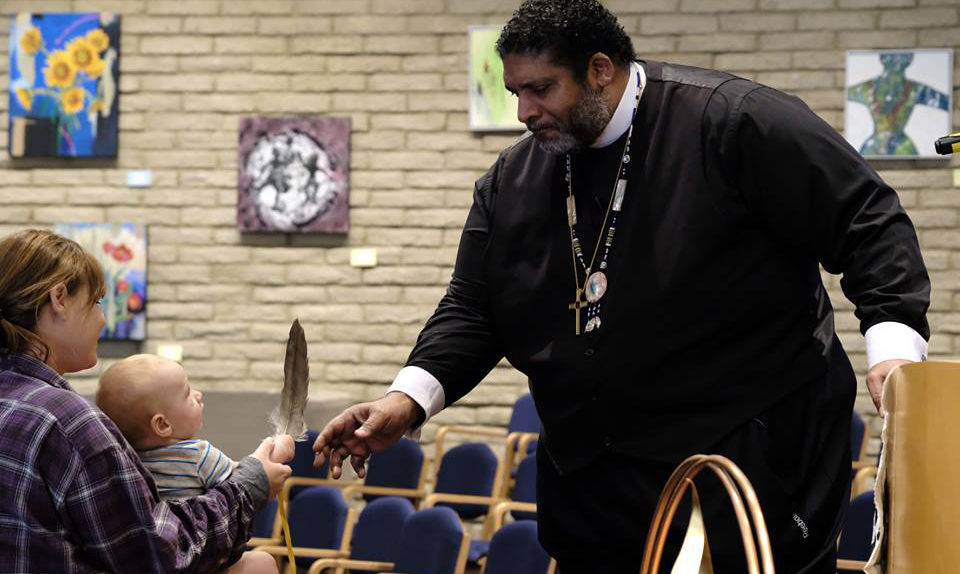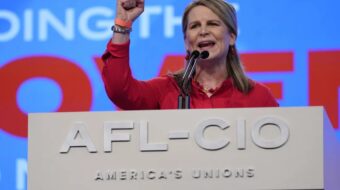
WASHINGTON—Saying he wants the new Poor People’s Campaign to “promote an agenda of truth,” its leader, the Rev. William Barber, is now explicitly linking U.S. militarism and wars to racism and a distorted U.S. economy. Echoing Dr. Martin Luther King 51 years ago, Barber declares that unless the U.S. turns away from its militaristic path, the nation is on a moral, political, and actual downhill slide.
Until now, Barber has listed a turnaround in “the war economy” as one goal the Poor People’s Campaign is advocating. The campaign will officially begin on Mother’s Day and then continue with mass rallies at the U.S. Capitol and more than 30 state capitols on May 14 and for 40 following days.
The drive, to push elimination of poverty to the top of the U.S. agenda, will reach a crescendo in a mass march in D.C. on June 23 and continue for years afterwards, he has previously said.
But Barber devoted his sermon in D.C.’s historic New York Avenue Presbyterian Church on Sunday night, May 6, explicitly to the history and impact of war and militarism on the U.S. economy and how they’re intertwined with the nation’s history of structural racism.
Again quoting Dr. King’s famed 1967 anti-war sermon in New York’s Riverside Church, Barber declared, “A nation that spends more on its military than on social justice is a nation approaching spiritual death.”
To prevent that, the U.S. must reorient its priorities away from militarism and war and towards domestic spending against poverty, income inequality, and for workers—including the right to unionize.
Militarism and war are long-time aspects of the U.S., Barber declared. The first European settlers brought racism, militarism, and violence with them and used it against Native Americans and against Africans brought over as slaves.
Settlers in New England, for example, waged war on indigenous people not just with “guns that were more powerful than arrows.” In one case, they deliberately infected goods with diseases they knew the natives lacked defenses for.
Though Barber did not mention it, the other early European colonizers of the Americas—the Spaniards—defeated and wiped out the Aztecs in Mexico through infection from smallpox, for which the natives lacked immunity.
That imperial war on indigenous people continued through the exterminations of the 1800s, the “Trail of Tears,” confinement on reservations, and forced assimilation, Barber added. “Manifest destiny,” the U.S. expansionist slogan of the 1840s, was an excuse for killing and evicting natives.
Captured Africans, meanwhile, were brutally treated, whipped, and murdered after being brought to the Americas. The militarism against African-Americans, he said, even includes the Second Amendment to the U.S. Constitution—which gun advocates now use to justify their “right to keep and bear arms”—because slaveholders wanted to make sure they had guns in case a slave uprising occurred.
Militarism and war have extended down through the centuries in the U.S., Barber said. It is linked to corporate greed and profits, he added—and it’s targeted black and brown people both at home and abroad.
Barber pointed out U.S. wars for the last half century—dating back to Vietnam and ranging forward to “narcissist” GOP bombing of Syria by President Donald Trump—have been waged against non-white people, including Southeast Asians and Muslims.
U.S. military spending, he added, is more than that of the next seven nations in the world combined, including three times that of China and nine times that of Russia. That money goes into the pockets and profits of military contractors. When war increases, so do their stock prices, Barber pointed out.
While a private in the U.S. military earns less than $30,000 yearly, the average CEO of a military contractor earns $19 million. And most of the privates come from poor white rural communities or poor minority communities in inner cities, he noted. Barber called it “a poverty draft.”
The militaristic tilt and the racist tinge have occurred despite warnings from everyone from Abraham Lincoln to Dwight Eisenhower. in his famed Second Inaugural Address, Lincoln blamed both North and South for the evil of slavery and said the war was just retribution for it.
And Ike’s 1961 farewell address, warning against the baleful influence of the military-industrial complex “was actually first written as the military-industrial-congressional complex,” Barber said.
“I come to connect the war economy to the five systemic ills” the U.S. suffers and the Poor People’s Campaign is fighting against, Barber said. The other four are “a system of poverty that affects more than 140 million people;” ecological disasters; “a distorted moral narrative;” and the combined oppressions of racism, xenophobia, Islamophobia, and misogyny.
“To address those four, you have to address militarism,” he declared.
Addressing militarism and reversing it, Barber says, includes not just cutting spending for war and on defense contractors, but also foreign military aid and the militarization of U.S. police forces, particularly those patrolling minority communities. And there was no reason, he said, for surplus military vehicles, given away by the Defense Department, to appear on the streets of Ferguson, Mo., after a police officer shot unarmed African-American man Michael Brown to death.
Barber also contended that U.S. military aid to Israel empowers its present right-wing government and obstructs a genuine peace there based on a two-state solution—one nation each for the Israelis and the Palestinians.
Reversing militarism also has to include diverting more money to the Veterans Affairs Department’s medical system, to care for the medically, mentally, and psychologically wounded veterans of U.S. wars, said Barber, whose home church in North Carolina is near a military base. Barber, the son and grandson of veterans, finds himself, he told the packed house, answering constant troubling questions from parishioners in the military and their families.
The vets’ psychological wounds, said Barber, come when they discover the causes they supposedly were fighting for were lies—and that they have more in common with the black and brown people they’re fighting than with the powerful elites that send them off to war. “‘My name is legion,’” Barber quoted a beggar in Galilee to Jesus, in the book of Mark. The beggar was a homeless veteran.
And the intertwined racism also came through for his father, a Navy veteran of World War II, who found himself “riding in the back of troop trains in Europe while white German prisoners rode up front.” The U.S. military was deeply segregated then.
Barber faulted presidents and lawmakers of both political parties for the war and militarism emphasis. The 1974 War Powers Act, he said, for example, “means the president can order troops” into battle “only [his emphasis] if there is an attack on U.S. territory, friends, or troops—which means the other day we dropped illegal bombs on Syria.”
But he also scorned congressional Democrats for crowing about the recent government spending law allotting more money for domestic programs and for the middle class “but not more for the poor.” The GOP, meanwhile, touted the $686 billion it got for the military.
“This means we must challenge war and militarism,” he declared. “If this is left unchallenged and un-critiqued, America will have, as Dr. King said, ‘the potential to be the greatest purveyor of violence the world has ever known.’”










